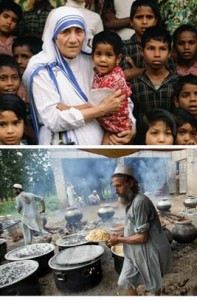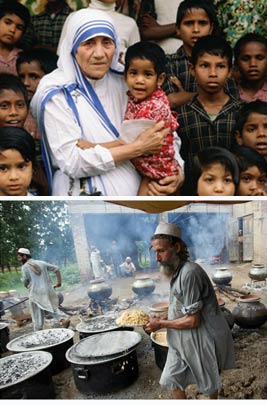
Above: Mother Teresa of Calcutta is an international symbol of faith and compassion. Below: A Muslim charity worker at a relief center for victims of the Pakistan floods in 2010 that affected some 20 million people. Credit: GPFF International
It is a profound truth that humanity is connected in a fundamental way. We share a common Origin, Source, and Creator – God. Beyond differences of race, religion or nationality, all people are part of one human family.
The essential principles of the world’s religious traditions affirm this truth.
Most people understand deep relationships in familial terms. They embrace the fact that humankind is one family: brothers and sisters, parents and children, husbands and wives. Inherently we recognize that we are bound as a family by a common spiritual heritage. Without recognizing God at the center, our human family will not be able to find harmony and secure everlasting peace.
Thus, it is imperative that people of faith are involved in the peacemaking process. Faith has always been a powerful motivating force in movements to positively transform society for the greatest good.
People of faith have a great deal in common ground. The founders of the great religions advocated peace and championed universal values and principles: ideals such as selfless love for humanity, charity and brotherhood, righteousness and justice. Their lives and teachings are a testament to the ideals of a family humanity under God.
The differences in specific doctrines, though significant, should not cause us to lose sight of our shared understandings.
It is crucial that people of faith to rise together and tackle the challenges that are facing our communities, nations and the world. Let us work to fulfill God’s dream.

